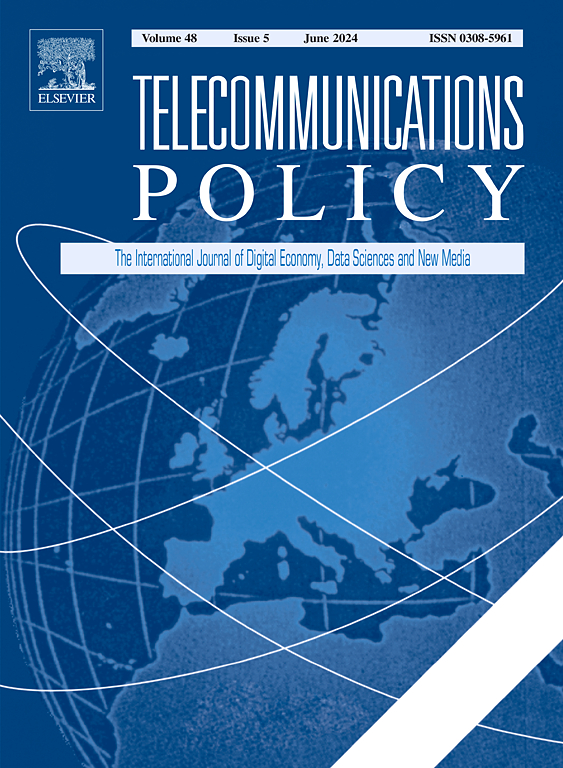评估数字化和经济:一种动态递归CGE建模方法
IF 6.4
2区 管理学
Q1 COMMUNICATION
引用次数: 0
摘要
发达经济体继续采用数字化并将其融入日常活动。人们可能会思考;重大的数字化升级如何影响发展中经济体?为了回答这个问题,并突出经济& &;数字化对发展中经济体的环境影响,本研究采用单一国家动态能源与环境综合可计算一般均衡模型(EEICGE),并设计了发展中经济体尼日利亚的5年渐进数字化政策计划。冲击模拟比较静态数据显示了数字化驱动的尼日利亚投资机会,并揭示了数字化提高了生产力和国家产出水平,同时导致尼日利亚经济总体价格水平大幅下降。它进一步加强了尼日利亚的国际贸易收入,使其商品和服务在国际(市场)社区中更便宜。尼日利亚经济的数字化也导致了结构性转变和现场劳动力平衡需求/供应的下降,主要由资本(机器)取代,但增加了在线创业劳动力服务,如在线培训课程/课程、喜剧小品等内容创作、在线销售等;配送服务、在线技能习得课程等,旨在增加代理商的劳动收入。因此,数字化增加了经济主体的消费、收入和福利,同时为富裕的家庭群体、企业和政府提供了利用数字化驱动的投资机会的机会,这些机会是通过减少消费预算来融资的。最后,本研究提出了有利于和支持尼日利亚等发展中经济体大幅数字化升级的证据。本文章由计算机程序翻译,如有差异,请以英文原文为准。
Assessing digitalization and the economy: A dynamic recursive CGE modelling approach
Advanced economies continue to adopt and embed digitalization into their everyday activities. One may ponder; how does a significant digitalization upgrade affect developing economies? To answer this question and highlight the economic & environmental effects of digitalization in a developing economy, this study adopts the singly-country dynamic Energy and Environment Integrated computable general equilibrium model (EEICGE) with a 5-year gradual digitalization policy plan design in Nigeria, a developing economy. The shock simulation comparative statics show digitalization-driven investment opportunities in Nigeria and reveal that digitalization increases productivity and national output levels while leading to a substantial decline in the general price levels in the Nigerian economy. It further strengthens Nigeria's international trade revenue and makes its goods and services cheaper in the international (market) communities. Digitalization of the Nigerian economy also results in a structural shift and decline in on-site labour equilibrium demand/supply that is substituted mainly with capital (machines) but increases online entrepreneurial labour services such as online training sessions/classes, content creations like comedy skits, online sells & delivery services, online skill acquisition sessions etc., aimed at increasing agents' labour income. Thus, digitalization increases the economic agents' consumption, income, and welfare while availing the rich household cohorts, firms, and governments the chance to take advantage of the digitalization-driven investment opportunities financed through decreases in consumption budgets. In the end, this study presents pieces of evidence that favour and support substantial digitalization upgrades in developing economies like Nigeria.
求助全文
通过发布文献求助,成功后即可免费获取论文全文。
去求助
来源期刊

Telecommunications Policy
工程技术-电信学
CiteScore
10.80
自引率
12.50%
发文量
122
审稿时长
38 days
期刊介绍:
Telecommunications Policy is concerned with the impact of digitalization in the economy and society. The journal is multidisciplinary, encompassing conceptual, theoretical and empirical studies, quantitative as well as qualitative. The scope includes policy, regulation, and governance; big data, artificial intelligence and data science; new and traditional sectors encompassing new media and the platform economy; management, entrepreneurship, innovation and use. Contributions may explore these topics at national, regional and international levels, including issues confronting both developed and developing countries. The papers accepted by the journal meet high standards of analytical rigor and policy relevance.
 求助内容:
求助内容: 应助结果提醒方式:
应助结果提醒方式:


